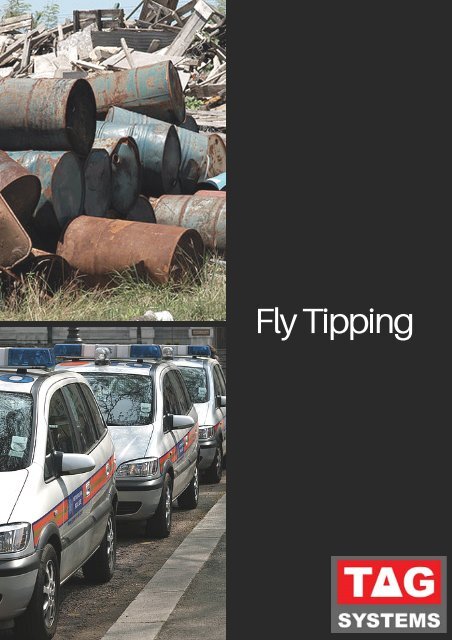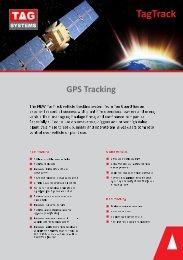Fly Tipping it's a bigger problem than you think
Fly tipping is something of a tradition in the UK.Fly tipping is something of a tradition in the UK. But the problem is much bigger than you think.
Fly tipping is something of a tradition in the UK.Fly tipping is something of a tradition in the UK. But the problem is much bigger than you think.
Create successful ePaper yourself
Turn your PDF publications into a flip-book with our unique Google optimized e-Paper software.
<strong>Fly</strong> <strong>Tipping</strong>
Introduction<br />
<strong>Fly</strong> tipping is something of a tradition in the UK. In the 1700s the<br />
River Fleet, in London, was so filled with waste that the<br />
authorities chose to simply turn it into a closed sewer in an<br />
attempt to stop people throwing household waste and dead<br />
animals into it. The tradition continues today and across the UK<br />
local authorities remain responsible for coming up with<br />
innovative solutions to clearing up other people’s mess. Plagues<br />
of black bin liners, pre-loved fridges, mountains of building<br />
rubble and the occasional stash of lethal asbestos continue to<br />
adorn the highways and byways of the UK.<br />
A Troubled and Troubling Landscape<br />
It’s a perennial <strong>problem</strong> and one that doesn’t seem likely to go<br />
away any time soon. Apart from a landscape strewn with binliners<br />
there is also a land-scape strewn with funding cuts to<br />
contend with, for the authorities that have to deal with the<br />
<strong>problem</strong> at least. As central government continues to cut local<br />
authority funding, the cost of fly tipping is becoming an<br />
increasingly big issue for local councils and finding innovative<br />
ways to address the situation and pass the buck back to those<br />
responsible for the waste becomes more pressing <strong>than</strong> ever.
<strong>Fly</strong> <strong>Tipping</strong> Facts<br />
The year 2013/14 saw a 20 per cent increase in the reported<br />
incidents of fly tipping, with two thirds of the waste being<br />
domestic refuse, the increase followed several years in which a<br />
decrease had been reported.<br />
47 per cent of incidents occur on or adjacent to highways, with<br />
other locations including bridleways, footpaths and alleyways<br />
accounting for 29 per cent of incidents.<br />
In 2013/14 estimated costs for clearance ran to £45.2 million –<br />
a 24 per cent increase on the previous year, while enforcement<br />
actions came to an estimated £17.3 million.<br />
While “single bag” incidents are common, 2013/14 saw a rise in<br />
reported incidents involving larger quantities. <strong>Fly</strong> tipping<br />
amounts range from a single bag up to full tipper loads,<br />
although medium sized loads account for around a third of<br />
incidents.<br />
The number of white goods (fridges being a common item)<br />
dumped rose by 152 per cent on the previous year from 13,000<br />
reports to 34,000.
Who’s In Charge?<br />
In general, the responsibility for clearing illegally dumped waste<br />
lies with local authorities. The Environment Agency will normally<br />
become involved with only the more serious cases – particularly<br />
organized illegal waste tipping operations and in cases of<br />
pollution on a larger scale. Both local authorities and the<br />
Environment Agency can prosecute but in many cases,<br />
particularly the most common type of cases, it’s down to local<br />
authorities to clear up and dispose of any items illegally<br />
dumped. This year’s rise in costs demonstrates well the burden<br />
that this responsibility puts on councils. While incidents have<br />
risen by 20 per cent, the cost of dealing with these incidents has<br />
risen by 24 per cent. In the case of English councils finding the<br />
funds to deal with the issue could prove increasingly difficult,<br />
with extra cuts to funding announced on 18th December 2014<br />
averaging 1.8 per cent – with some councils facing cuts of even<br />
6.4 per cent. So in summary the costs are increasing and the<br />
budget is decreasing!
Common Ways to Deal with <strong>Fly</strong> <strong>Tipping</strong><br />
1 - Foot Patrols – some councils have employed these for many<br />
years and others employ regular or part-time officers to monitor<br />
known black (bag) spots. These can be effective in dealing<br />
promptly with the issue and catching the offenders. Officers<br />
aren’t above donning gloves to check through bags to find<br />
evidence of the former owner of the unwanted rubbish. Foot<br />
patrols can be effective but are costly in terms of time and<br />
staffing resources. Mostly they are also restricted to urban<br />
environments where the chance of catching offenders in the act<br />
is higher. They have the advantage of raising the profile of the<br />
<strong>problem</strong> and helping to educate the public in responsible waste<br />
disposal.
2 - CCTV cameras are the next and probably most favoured<br />
option. Traditionally, fixed security and existing CCTV systems<br />
have been employed to monitor for fly tipping and many<br />
councils have used them for several years. They can be<br />
deployed in known trouble-spots, if necessary and are ideal for<br />
gathering evidence as well as helping councils respond quickly<br />
to incidents and remove rubbish from the streets. Again fixed<br />
CCTV is ideal in urban locations.<br />
3 - The latest development in the CCTV world is the covert and<br />
portable option like the J-Cam, from Tag Guard. These systems<br />
offer the most in terms of flexibility. In many locations, often in<br />
rural settings, a small pile of fly-tipped waste can rapidly grow.<br />
Mobile and self-contained units which are also disguised can<br />
help to nip the <strong>problem</strong> in the bud quickly. The advantages are<br />
obvious in more difficult to police locations as covert cameras<br />
can be deployed anywhere to help clean up the act of unwanted<br />
tippers. Many systems can be combined with intruder alert<br />
systems, again, great for quieter areas and use GPRS to allow<br />
remote monitoring
Let Tag monitor, detect...<br />
and minimise the threat.












